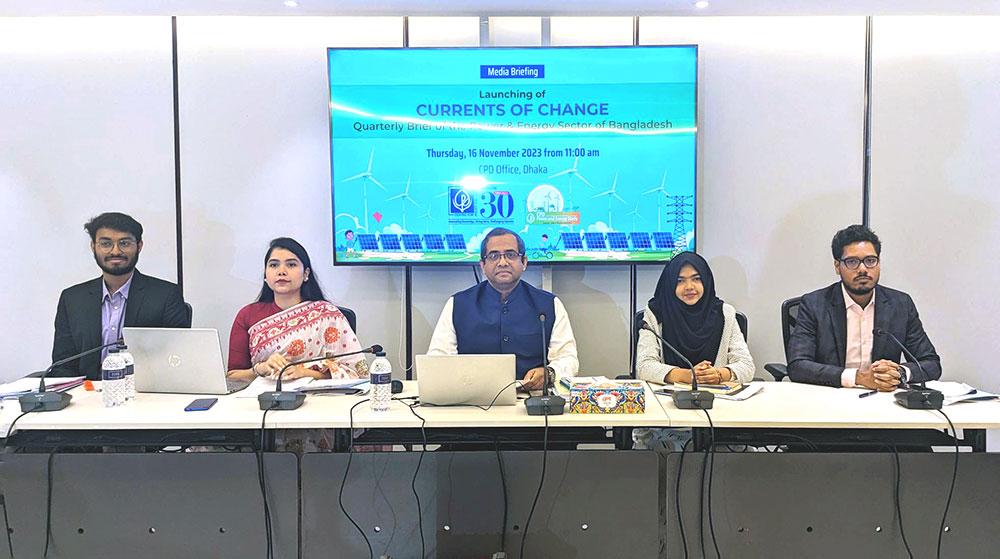
Centre for Policy Dialogue (CPD) Power and Energy Studies has launched an initiative to monitor and track sectoral performance from the standpoint of energy transition. A quarterly brief titled ‘Currents of Change: Quarterly Brief of the Power & Energy Sector of Bangladesh’ will be published on energy transition on a regular basis. The first volume of the quarterly brief, July- September 2023 has been published and highlights the following issues of the power and energy sector during the first quarter of FY2024.
Bangladesh’s power and energy sector has been passing a critical time as it has confronted several challenges during the first quarter of FY 2024, July- September 2023. Poor energy security, financial inability to import energy and fuel, increase of coal usage for power generation, unwillingness to explore and expedite domestic gas resources, tendency to opt for imported LNG and LNG infrastructure are the key factors for the sectoral instability observed during July- September 2023. The escalating import costs for petroleum oil and LNG has created fiscal pressure in the Q1 of FY2024, demanding immediate attention. The Ministry of Power, Energy, and Mineral Resources (MoPEMR) has demonstrated optimistic performance in attracting foreign investment, grants, and loans for renewable energy. However, progress in completing and operating renewable energy-based power plants from July to September 2023 fell below expectations.
Despite advancements in transmission lines and substations, there has been an increase in power interruptions and outages during July and September 2023. This underscores the urgency of implementing a smart grid and modernising the transmission and distribution system to enhance reliability and address the growing challenges in the power supply infrastructure.
During July- September 2023, the Bangladesh Power Development Board (BPDB) has expanded its installed power generation capacity, relying on coal, gas, or oil-fired plants, despite having excess unutilised capacity. In the last quarter, coal-based power generation took precedence over imported oil due to high fuel import costs and the unavailability of gas, including Liquefied Natural Gas (LNG), contradicting the government’s commitment to limit coal use.
Based on the findings and insights of this quarterly brief, a media briefing was organised by the Centre for Policy Dialogue (CPD), on Thursday, 16 November 2023.
Dr Khondaker Golam Moazzem, Research Director, CPD, chaired the briefing and remarked ‘Government’s decisions and actions during July- September 2023 did not align with it’s commitment for energy tranisiton while ensuring energy security. It is expected that the government will take immediate action to deploy renewable energy to balance the shortage in power generation’.
In her keynote presentation, Ms Helen Mashiyat Preoty, Research Associate, CPD, urged ‘The MoPEMR should prioritise reducing import dependency and focus on investing in sustainable domestic sources, such as natural gas exploration and renewable energy in the upcoming quarter’.
Addressing import cost concerns, she said that a potential short to medium-term solution involves allocating resources from the Annual Development Programme (ADP) and the national budget for exploring both old and new gas fields and wells. She also suggested that in the ongoing and upcoming quarter the government should allocate additional resources to fulfill its commitment to expedite the drilling of 46 gas well.
‘The renewable energy-based power plants that are under construction or in the pipeline should be completed and added to the grid on a priority basis within the expected timeline’, recommended by Ms Preoty.
She emphasised redirecting capacity payments from zero-production plants towards innovation policies for renewable energy mentioning that renewable energy will be the cheapest energy source in medium to long term. This may involve initiatives such as tax-adjusted energy prices and subsidies for Research and Development (R&D) for the renewable energy sector. Bangladesh can facilitate the development of local, cost-effective technology by implementing innovation policies, paving the way for a sustainable future in renewable energy.
An open-floor Q&A session with journalists from both print and electronic media followed the discussion. The study team responded to the questions and said that there is a prevalent misconception that discussions around renewable energy imply an immediate, total self-sufficiency in the country. The reality is quite the opposite, emphasising a gradual transition in step with renewable energy transformation. The government’s target of forty per cent renewable energy within forty-one years allows for a mix, with the remaining sixty per cent from biomass, biogas mixing, or income generation. The key idea is a stepwise gradual approach rather than an abrupt shift.



